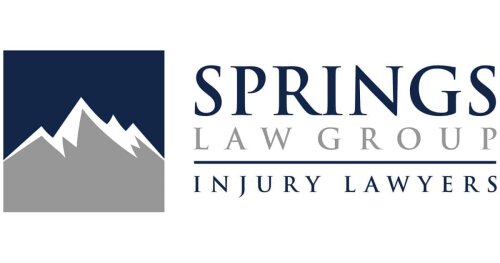Best Restructuring & Insolvency Lawyers in Colorado Springs
Share your needs with us, get contacted by law firms.
Free. Takes 2 min.
List of the best lawyers in Colorado Springs, United States

About Restructuring & Insolvency Law in Colorado Springs, United States
Restructuring and insolvency law is designed to help individuals and businesses facing significant financial distress. In Colorado Springs, as in other parts of the United States, these laws provide structured processes for managing debts, reorganizing financially troubled entities, and, when necessary, liquidating assets to pay creditors. The aim is either to help the debtor regain stability or to ensure an orderly process for debt resolution. Colorado Springs follows federal bankruptcy laws but also has unique local rules, court procedures, and resources tailored to its community.
Why You May Need a Lawyer
Navigating restructuring and insolvency matters can be complex. Common situations where you may need a lawyer include:
- Filing for personal or business bankruptcy
- Negotiating with creditors to reduce or reorganize debt
- Understanding the implications of foreclosure or repossession
- Facing lawsuits or judgments related to debts
- Assisting with corporate restructuring to avoid insolvency
- Guiding through Chapter 7, Chapter 11, or Chapter 13 bankruptcy proceedings
- Protecting personal or business assets legally
- Representing your interests in bankruptcy court
- Dealing with secured and unsecured creditors
- Complying with local and federal bankruptcy rules
An experienced lawyer can provide objective advice, negotiate on your behalf, and help you make informed decisions to secure your financial future.
Local Laws Overview
In Colorado Springs, restructuring and insolvency matters are generally governed by federal bankruptcy law, specifically the United States Bankruptcy Code. However, there are important Colorado state laws and local union court rules that also play a role:
- The U.S. Bankruptcy Court for the District of Colorado, with a courthouse in Colorado Springs, handles all local bankruptcy filings.
- State property exemption laws determine which assets you can keep during bankruptcy in Colorado.
- The automatic stay provision under federal law halts most collection actions immediately after filing.
- Colorado-specific procedures may apply to foreclosure and repossession of property due to unpaid debts.
- Local rules may affect the documentation required, filing fees, and how cases are handled procedurally in Colorado Springs.
Because both federal and state laws apply, consulting a Colorado Springs-based insolvency attorney offers the best chance of making sure your rights are protected.
Frequently Asked Questions
What is the difference between restructuring and insolvency?
Restructuring generally refers to reorganizing debts and business operations without necessarily going bankrupt, while insolvency occurs when an individual or business cannot meet their debt obligations as they come due. Insolvency may lead to formal bankruptcy proceedings.
What types of bankruptcy are available in Colorado Springs?
The most common types are Chapter 7 (liquidation for individuals and businesses), Chapter 11 (business reorganization), and Chapter 13 (repayment plans for individuals). Each has specific requirements and outcomes.
Can I keep my house or car if I file for bankruptcy in Colorado Springs?
Colorado exemption laws allow you to protect certain amounts of home equity and vehicle value, so you may be able to keep these assets depending on your circumstances and the type of bankruptcy you file.
How long does bankruptcy stay on my credit report?
A Chapter 7 bankruptcy typically remains on your credit report for 10 years, while a Chapter 13 remains for 7 years from the filing date.
Will bankruptcy stop creditors from contacting me?
Yes, the automatic stay provision in bankruptcy law stops most collection efforts, including calls, letters, lawsuits, and wage garnishments, as soon as you file.
Are there alternatives to filing for bankruptcy in Colorado Springs?
Yes, alternatives include debt consolidation, negotiating settlements with creditors, or entering into voluntary repayment plans. Consulting an attorney can help you evaluate which option is best for you.
Does my spouse have to file for bankruptcy with me?
No, you can file individually or jointly. However, your attorney can explain the impacts on joint property and debt depending on your specific situation.
How much does it cost to hire a bankruptcy lawyer in Colorado Springs?
Costs vary depending on the complexity of your case and the type of bankruptcy. Many lawyers offer payment plans and free initial consultations.
What paperwork will I need to file for bankruptcy?
You will need financial documents such as proof of income, tax returns, a list of assets and debts, and information about your expenses. A local attorney can provide a checklist tailored to your case.
How do I know which type of bankruptcy is right for me?
Determining the best bankruptcy chapter depends on your income, debt levels, assets, and long-term goals. A Colorado Springs bankruptcy lawyer can guide you after a thorough review of your finances.
Additional Resources
If you are considering your restructuring or insolvency options in Colorado Springs, you may find these resources helpful:
- United States Bankruptcy Court for the District of Colorado
- Colorado Judicial Branch - Self-Help Resources
- El Paso County Bar Association - Lawyer referral services
- Colorado Legal Services - Free or low-cost legal aid
- Consumer Credit Counseling Service of Colorado - Nonprofit debt advice
- Colorado Office of the Attorney General - Consumer protection information
Next Steps
If you are facing financial distress or need guidance on restructuring or insolvency in Colorado Springs, the first step is to assess your financial situation. Gather all relevant financial documents and make a list of your creditors and debts. Next, consult with a reputable local attorney who specializes in bankruptcy and insolvency law. A professional can explain your options, ensure that filings are accurate, and represent your interests in negotiations or court proceedings. Many attorneys offer free consultations, so you can get initial advice without commitment. Acting early improves your chances of protecting your assets and achieving the best possible outcome.
Lawzana helps you find the best lawyers and law firms in Colorado Springs through a curated and pre-screened list of qualified legal professionals. Our platform offers rankings and detailed profiles of attorneys and law firms, allowing you to compare based on practice areas, including Restructuring & Insolvency, experience, and client feedback.
Each profile includes a description of the firm's areas of practice, client reviews, team members and partners, year of establishment, spoken languages, office locations, contact information, social media presence, and any published articles or resources. Most firms on our platform speak English and are experienced in both local and international legal matters.
Get a quote from top-rated law firms in Colorado Springs, United States — quickly, securely, and without unnecessary hassle.
Disclaimer:
The information provided on this page is for general informational purposes only and does not constitute legal advice. While we strive to ensure the accuracy and relevance of the content, legal information may change over time, and interpretations of the law can vary. You should always consult with a qualified legal professional for advice specific to your situation.
We disclaim all liability for actions taken or not taken based on the content of this page. If you believe any information is incorrect or outdated, please contact us, and we will review and update it where appropriate.









